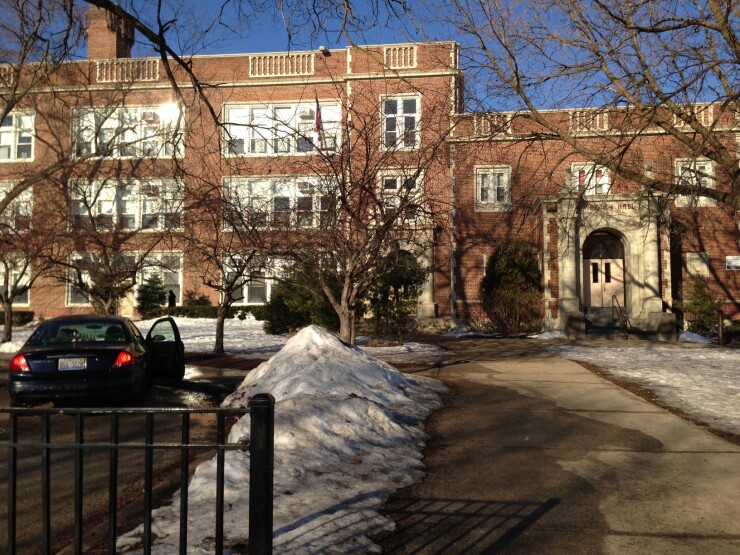CHICAGO – Junk-rated Chicago Public Schools plans to bring about $900 million of new money and refunding debt to market in mid-November with the goal of shedding its most costly floating-rate debt.
The administration is seeking board of education approval Wednesday to sell up to $1.1 billion, but only $900 million to $930 million would be tapped unless “there is strong market demand and attractive pricing” in which case it might bump the sale up, CPS said in a statement.
The district said it intends to sell $290 million of new money to fund capital projects and to refinance $630 million for savings – but not for restructuring purposes as it has done in the past to push off debt service for immediate budget relief. The district is aiming to sell the week of Nov. 13.
The board agenda, however, lists two new money authorizations – one for $280 million of unlimited tax general obligation bonds and the other under the district’s newer capital improvement tax levy credit established last year.
New money would fund the district’s $136 million fiscal 2018 capital program as well as pay for deferred maintenance and approved capital improvement tax projects.

On the refunding, officials believe they can shave $175 million off long term interest costs including $12 million in the current fiscal year and $9.6 million annually through fiscal 2035.
“The historic state education funding agreement put CPS on stronger financial footing and created an opportunity to significantly reduce borrowing costs so that more district resources can reach classrooms,” said CPS spokesman Michael Passman.
About $440 million of the refinancing will take out expensive floating-rate bonds and another $190 million will refund fixed-rate bonds for savings.
The district’s secondary market trading spreads have tightened since passage of a $36 billion fiscal 2018 state budget package that provided an additional $300 million in aid and allowed the district to bypass property tax caps and raise an additional $150 million. Chicago is providing another $80 million to help the district tackle a $550 million deficit.
The district said it believes it can trade the 9% rate for one around 5%.
CPS’ bonds are thinly traded in the secondary market but trades earlier this month put the board’s 25 year maturities at about a 225 basis point spread to the Municipal Market Data’s top benchmark, MMD strategist Daniel Berger said Tuesday. The MMD’s AAA benchmark on a 25 year maturity was at 2.68% Tuesday.
Floating-rate bonds make up $1.05 billion of the district’s roughly $7 billion GO portfolio. Beginning last year, the board opted not to remarket some series when their remarketing, or expiration dates, came due. That pushed the rates on some debt up to a maximum fixed rate of 9%.
Six series totaling $456 million carry a 9% rate. Another one for $157 million rises to 7.5% in June and then 9% next September if not remarketed. Two series for $263 million and $178 million don’t expire until 2034 and 2031, respectively, and so the district is still paying a rate tied to the LIBOR index.
The district pays punishing yield penalties on its short-and-long term borrowing although both have improved. Its latest GOs sold this year landed at yields in the low to mid 7% range as the district added a new security feature known as a post default security mechanism that provides an intercept of state aid in the event of a default. Its GO sale last year landed at 8.5%.
Its new investment grade CIT bonds landed at a high yield of 6.25%.
CPS paid initial rates in the 6% range on the grant anticipation notes sold earlier this year and recently redeemed. On its fiscal 2017 tax anticipation notes it paid LIBOR plus 400 bp. The district took out its first fiscal 2018 tranches of TANs last month, one for $93.5 million and one for $56.5 million. Both are listed as variable-rate paper with coupons of 3.614% and they mature April 2.
The board also will vote Wednesday on a revised budget that reflects the new city and state aid and on a revised property tax levy. The district said during budget hearings its levy would rise by 8.3% this year.
The board earlier this summer signed off on a $5.75 billion budget and approved up to $1.55 billion of short-term note borrowing. The tax levy being sought totals nearly $2.9 billion and includes $2.4 billion for educational purposes, $29 million for settlements and insurance and other operating costs, $426 million for teachers’ pensions, and some other costs.
The district remains deep in junk territory. Moody's Investors Service in September concluded a review for a possible downgrade launched in July by affirming the district’s B3 rating and it shifted the outlook to stable from negative.
Moody's concerns over the school district's strained liquidity, debt costs, and overall distressed condition remain. But the recent state funding package eases near-term strains.





